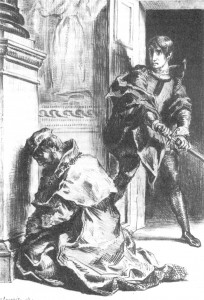Act I Scene III contrasts Polonius’s different attitude towards Laertes and Ophelia, which he regards Laertes more important than Ophelia. When he speaks to Laertes, he says: “And you are stay’d for. There; my blessing with thee!” (Act I, Scene III, Line 57) While when he criticizes Ophelia’s affection with Hamlet, he says: “Affection? pooh! you speak like a green girl.” (I, III, 101)
Through the different tones that Polonius uses talking to Laertes and Ophelia, it tells that Polonius loves his son much more than his daughter. When he speaks to Laertes, he gives him lots of valuable suggestions about how to be a wise person and even lays his hand on Laertes’ head, but when he speaks to Ophelia, the words he uses are very mocking.
Act I Scene III reveals Laertes’ and Polonius’ opposition against Hamlet. When Laertes suggests Ophelia not to fall in love with Hamlet, he says: “Forward, not permanent, sweet, not lasting, the perfume and suppliance of a minute; no more.” (I, III, 9)
Also Polonius expresses almost the same idea when he speaks to Ophelia: “Do not believe his vows; for they are brokers.” (I, III, 127)
From Laertes’ and Polonius’ speech, it shows that they both do not believe in Hamlet, they think that his vows are untrue, unabiding and only driven by his impulse.
In Act I Scene III Polonius depicts Hamlet to be unreliable and to have intentions that are not noble; this may foreshadow a negative outcome in Hamlet and Ophelia’s relationship later in the play.
When Polonius is questioning Ophelia regarding her relationship with Hamlet he states, “Do not believe his vows; for they are brokers, not of that dye which their investments show,” (I, III, 127-128). Polonius does not want his daughter to become impure by giving too much of herself to a man who may not be fully committed to a future with her.
Throughout the scene, Polonius is so adamant that Hamlet is no good and that Hamlet will make a fool of his daughter that readers start to wonder whether there is more to Hamlet than has been revealed. If Polonius has accurately described Hamlet’s true character then it can be foreshadowed the Hamlet and Ophelia’s relationship will ultimately lead to failure.
In Act I Scene III light humor is provided when Polonius attempts to make witty remarks by using the word “tender” in different contexts. In an attempt to ridicule Ophelia Polonius says, “Marry, I’ll teach you: think yourself a baby, that you have ta’en these tenders for true pay, which are not sterling. Tender yourself more dearly; or—not to crack the wind of the poor phrase, running it thus—you’ll tender me a fool.” (I, III, 105-109).
Shakespeare’s use of humor in this scene contrasts the mood of the rest of the scene which is serious and at times tense. This use of humor is subtle but may provide some relief from the conflict that is occurring between Ophelia and her father.
It is revealed in Act I Scene III that Ophelia displays characteristics of someone who is naive. She believes that Hamlet loves her and that his intentions are honorable. She is blinded by his affections and her perception of what love truly is.
This is displayed in this scene when Laertes has departed and Polonius and Ophelia are discussing Hamlet, at this time Ophelia declares “My lord, he hath importuned me with love in honorable fashion.” (I, III, 110-111).
Ophelia believes that the attention she receives from Hamlet is love, his intentions are honorable, and that the love will be everlasting. Ophelia is ignorant to the fact that her brother as well as her father are giving her advice in order to protect her from Hamlet’s true nature.
In Act I Scene III the audience develops pathos for Ophelia. Ophelia is told by her father that she may no longer spend time with Hamlet; this is very difficult for Ophelia as she is deeply in love with him.
She is torn between the loyalty that she feels toward her father and the love she feels for Hamlet. When Polonius is speaking to his daughter about her relationship with Hamlet he explains, “As to give words or talk with the Lord Hamlet. Look to‘t, I charge you. Come your ways.” (I, III, 134-135).
Polonius reveals that he is in control of his daughter and that Ophelia has no say in the matter of her relationship with Hamlet. This develops pathos for Ophelia as the audience is sympathetic towards the fact that her father stands in the way of her love for Hamlet.


What does Ophelia say that makes you think she is in such dire inner conflict at this point? Laertes and Polonius make excellent points, but it seems more like they are trying to make themselves feel better. Ophelia’s just at the center, taking it all in.
Thank you. Very helpful